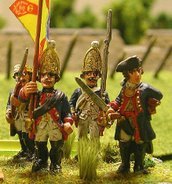I asked a mathematician friend of mine to help us come up with a way to roll the numbers 1-10 on two 6-sided dice using custom numbers on each face of the two dice. We wanted the numbers to have a 'normal' distribution similar to the 2-12 rolls a pair of normal dice have only with outcomes from 1-10. My friend found two solutions for making a pair of 6-sided dice to have outcomes from 1-10 formed in a normal distribution.
Each 'Case' has 2 dice, A and B with sides as indicated:
DICE Outcome Distribution
======================== =====================================
Case 1: A: 0 1 2 3 4 5 Number: 1 2 3 4 5 6 7 8 9 10
B: 1 2 3 3 4 5 Freq: 1 2 4 5 6 6 5 4 2 1
Case 2: A: 0 2 3 3 4 6 Number: 1 2 3 4 5 6 7 8 9 10
B: 1 2 2 3 3 4 Freq: 1 2 3 5 7 7 5 3 2 1
My mathematician friends says that Case 1 fits true statistical 'normal' distribution for all positions within 3.76 percent. Case 2 fits as well at the ends (same dist for 1, 2, 9 & 10) but is 'skewed' towards the center values too much (about 15% off of 'normal' distribution). Both are useable for wargaming. Case 2 would be more 'average' in wargaming terms.
Die 1A's opposite faces would add up to 5, Die 1B 6, Die 2A 6 and Die 2B 5. As for the actual arrangement of the faces, that is left as an excersize for the reader. As long as the opposite sizes add up the the correct numbers statistical distribution should be 'fair'. FYI normal dice add up to 7 on each pair of opposite faces.
I'm posting this information for my friends who play Fire & Fury (both classic and regimental versions) as a possible house modification. FYI I tried this and locals universally hated it and much preferred the original 10-sided 'wild' dice.
Warmaster Revolution: Kislev v. Lizardmen
50 minutes ago





6 comments:
Very interesting ideas, thanks!!
Food for thought> Thanks Allan.
You diamond... :o)
Hi AJ
You can get a similar result by using any of teh following
1) 2d6-1 or 2d6-2
2) 2d6 with a restated table so that a "1" on the table becomes "<=2" and "10" becomes "12+" etc
I'd be worried with using 2 differently modified types of d6. What if the Blue force uses two "A" dice and the Red force two "B" dice?
Also I'm not sure I buy your freinds statistics. BY my math Case 1 if as much as 36% off the normal curve for the outcomes 1 and 10!
But this is a great conversation trail. Nothing gets a gamers blood up like dice.
Cheers,
PD
I'm not in a position to argue the accuracy of the statistical calculations with you as I'm a lowly computer scientist. I will say that my friend, is actually a co-worker with a PHD in mathematics and provides consulting services for the nuclear physicists at the University I work for. I trust his information implicitly.
AJ
Fair enough, it does depend on the parameter inputs and I didn't intend to start a statistical bunfight (I teach probability models at my University).
I re-read your initial post and I was interested that the local gamers preferred the wild d10. I think that's the approach I would follow - go with the rules as written and use the randomness to stoke discussions in the bar after the battle! Plus if you go with the rules as is, then it's the writer's fault. If you go with a a home brew fix it's your fault!
Cheers, and enjoying your blog.
PD
Post a Comment